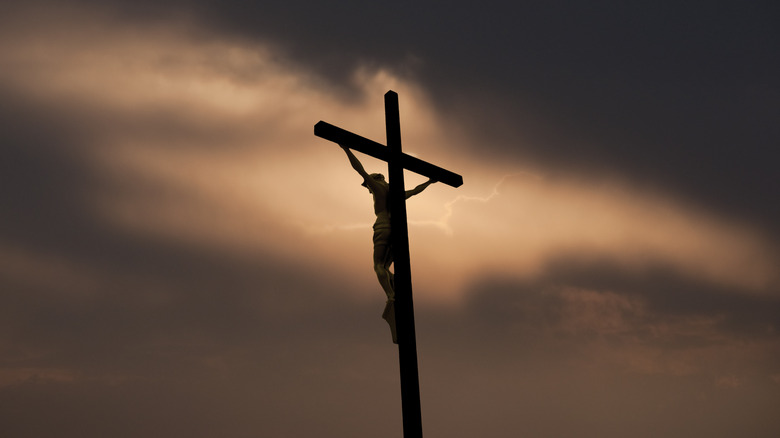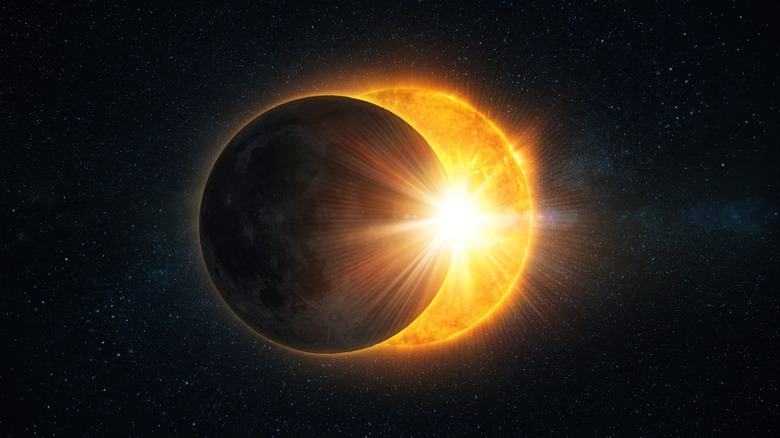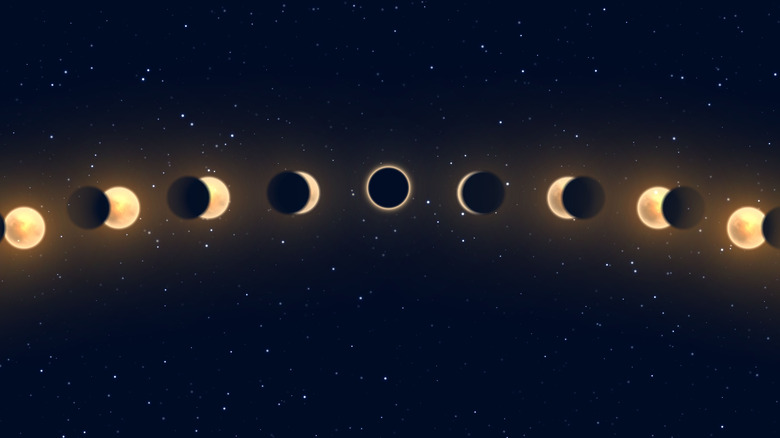The Eerie Connection Between Jesus' Death And A Solar Eclipse
It isn't too hard to see why ancient peoples would have viewed solar eclipses with a mixture of awe and terror. Perhaps a cosmic demon swallowed the sun and burned its tongue and then spat the sun out as Indonesia and Polynesian folklore describe. Or maybe it was time for the female moon to get down with the male sun for some long overdue private time, as certain Australian Aboriginals believed. Or maybe, for those living in the early 1st century C.E., the solar eclipse marked the death of an incarnate god.
As it turns out, the biblical New Testament just might describe such an event, provided we interpret things in a certain way. Both Luke 23 and Mark 15 say that a "darkness came over the whole land" when Jesus died during his crucifixion. While this is certainly a fittingly portentous event for the death of the Son of God, other major historical events have apparently come equipped with similar omens. Such events include the birth of the Muslim Prophet Mohammed, the death of England's King Henry I, and a 1919 eclipse that helped confirm Albert Einstein's Theory of General Relativity, of all things.
That last event is the only event on the ecliptic list when those present would have known that they were watching the moon pass in front of the sun. And yet, even if such scientific knowledge was available to those alive in ancient Judea when Jesus was crucified, the timing would have been suspicious, indeed.
The Bible says the sky turned dark
As mentioned, the gospels of Luke and Mark both say that darkness swept over the land when Jesus died. Luke 23 mentions that the darkness lasted for three hours, from noon until three in the afternoon, and Mark 15 cites the same time range. Luke adds that the darkness started because "the sun stopped shining." Both these gospels follow up their descriptions of apparent eclipses by quoting different final words for Jesus. In Luke's case Jesus utters the famous, "Father, into your hands I commit my spirit" line, while in Mark's case, he shouts the far more despairing, "My God, my God, why have you forsaken me?" line. After speaking these final words, Jesus dies.
For Christian believers, it might not only seem plausible that a solar eclipse happened around that moment but obviously true. Interestingly enough, it does indeed seem like there were two separate solar eclipses right around the time range when Jesus would have been crucified, assuming his traditional death year of somewhere between 29 to 34 C.E. According to CBS News, there were two solar eclipses visible in that part of the world right around the time Jesus might have died — one in 29 C.E., the other in 33 C.E. So even though sky turning dark upon the death of a deity creates some handy narrative drama, it looks like the sky might actually have turned dark — albeit completely naturally — right around the time when Jesus died.
Alternative ecliptic explanations
Barring the absolute truth of the biblical accounts in question, it pays to look into additional explanations for the supposed eclipse described at the death of Jesus. One possible explanation — and no disrespect meant to Christian believers — is that the event was just made up. Overall, the Bible is somewhat fond of equating dramatic events with celestial occurrences, particularly when it comes to the sun. The books of Matthew, Mark, Acts, and Joel all describe the sun turning dark in future apocalyptic days. Those apocalyptic days might be the ones described in the Bible's final book Revelations 8, when at one point "a third of the sun" gets wiped out from the sky. And back in Exodus 10, an inexplicable darkness covered Egypt for three days when Moses was trying to free the Israelites from slavery.
Of course, there's no reason that such descriptions need to be taken literally. And yet, when biblical writers describe specific time frames, we become at liberty to ask questions about those time frames. Case in point: Luke and Mark both say that the darkness at Jesus' death lasted for three hours. In reality, solar eclipses last between 3.5 and 4 minutes on average — at least when the sun is fully covered. The entire, partial eclipse (pictured above) lasts about 60 to 80 minutes. But naturally, if the Bible is describing an actual, supernatural event, then such an event need not conform to established time frames regarding eclipses — or anything else, for that matter.


